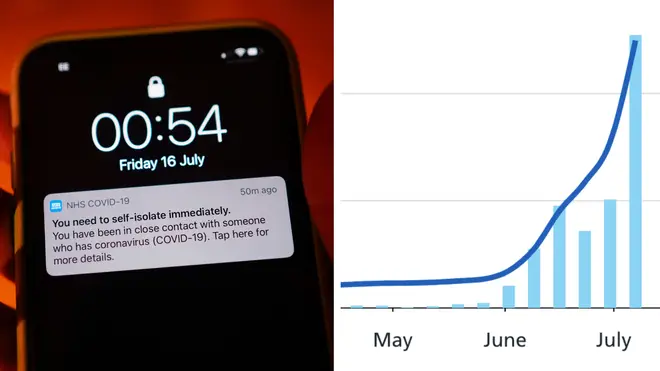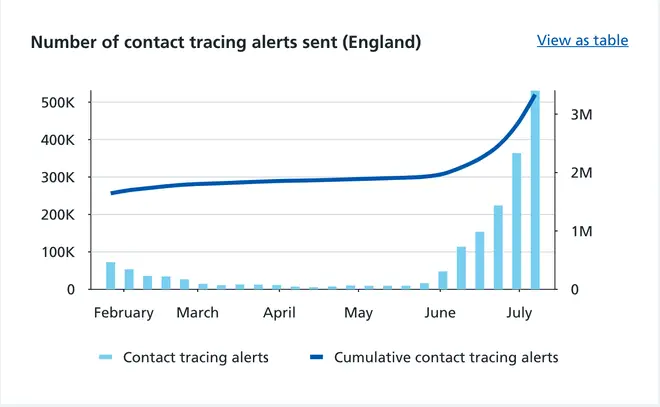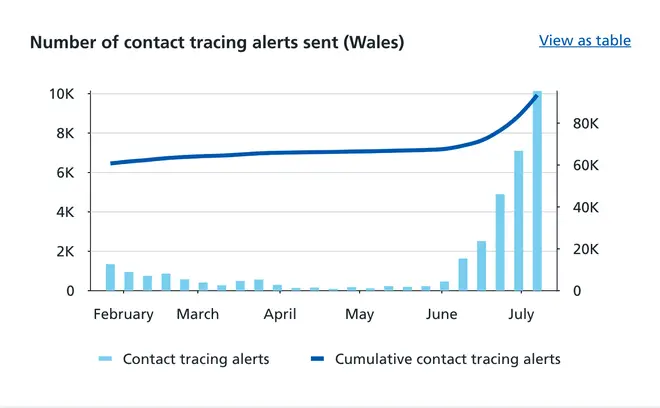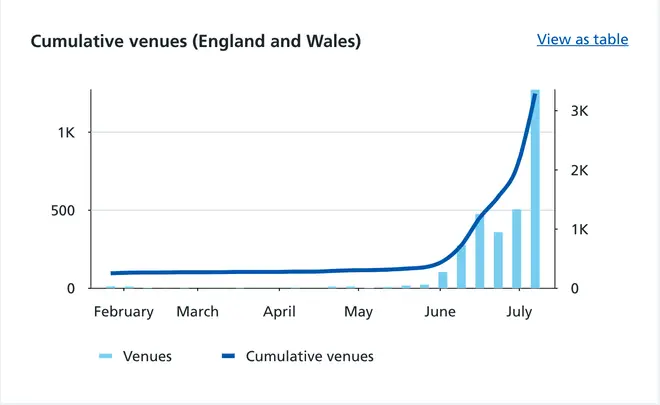
Ian Payne 4am - 7am
16 July 2021, 11:24 | Updated: 16 July 2021, 11:40

Businesses and hospitals have warned the NHS app 'pingdemic' is bringing the country to its knees. While the public waits for the government to 'tune' the app, just how bad are the self-isolation alerts?
The much-delayed NHS Covid-19 app was finally launched on 24 September 2020 to much fanfare, with the government promoting it with adverts in newspapers, online and on social media.
Ministers took to the airwaves to urge people to download it, and tens of millions did.
But as cases rise in a largely vaccinated population, the government and Test and Trace team have been forced to admit that the app requires "tuning".
This is unlikely to be a quick fix, with Communities Secretary Robert Jenrick telling LBC: “The government is going to be setting out its plans in the coming weeks, so I’m not going to pre-empt those.”
Read more: NHS app to be 'tuned' after 62% spike in people told to self-isolate in a week
Read more: 'Pingdemic' fury as NHS app 'pings neighbours through walls'

NHS Covid app to be changed "in weeks"
Despite this, officials have urged people not to uninstall the app or ignore its alerts, with the head of the UK Health Security Agency, Dr Jenny Harries, telling MPs last week that the app had resulted in 500,000 cases of Covid-19 being detected.
From 16 August, double-jabbed people can avoid isolating if they come into contact with a Covid case. However, there is almost a month between restrictions lifting and these new rule coming into force, with many warning this cannot continue.
LBC looks at the numbers in the so-called 'pingdemic'
The most recent data revealed 520,194 people were ordered to self-isolate in the week up to 7 July. This was a 46 percent increase on the previous week.


As people are normally required to isolate for 10 days, this means significantly more than half a million people are likely to be currently self-isolating due to the app.
One estimate said as many as 1.6m people are currently self-isolating once children and those who actually have Covid are taken into account.
Another suggested the figure could even be over two million, calculated on the basis that on average three people are told to self-isolate for every positive case.
The Department for Health and Social Care could not provide an exact total for the number currently self-isolating.

Nick Ferrari challenges minister over NHS app ping-demic
The increase in the number of people self-isolating appears to be due to an increase in cases, rather than any change to the app.
As mentioned, from the week ending 30 June to the week ending 7 July there was a 46 increase in the number of people pinged by the app.
Meanwhile, NHS Track and Trace data shows across the same period there was a 43 percent increase in the numbers testing positive week on week.
Read more: 'Riot police checking a child is self-isolating, does that make you proud to be British?'
Read more: NHS Covid app sends half a million alerts in a week amid staff shortage fears
But there has been a significant spike in the number of venue alerts - telling people they have been at a venue where someone tested positive.
Between the week-ending 30 June and the week-ending 7 July there was a 151 percent increase in the number of venue alerts sent, to 1,247.

In fact, 38 percent of all venue alerts issued since the data began in January 2021 were issued in the week to 7 July.
This occurred even as the number of venue QR check-ins decreased week-on-week by 9.4 percent from 30 June to 7 July.
As hundreds of thousands of people are told to self-isolate the impact on the country is racking up.
Speaking to LBC's Nick Ferrari at Breakfast, the President of the Confederation of British Industry, Lord Bilimoria described it as a "very concerning situation."
He said 20% of staff in the hospitality sector were being forced to self-isolate and up to 25% of staff in the health service.
Read more: The NHS app is 'wrecking the economy', Lord Bilimoria says
Read more: Pub boss: People are turning off NHS app to avoid being pinged

NHS Covid app pings: This is a serious situation
The National Care Association has echoed this, warning of "real staffing issues" in care homes because of the app, while some hospital trusts have had up to 500 staff isolating at a time.
The car industry has also spoken out, with Rolls-Royce CEO Torsten Muller-Otvos not ruling out a complete shutdown of their factory as the number off work goes "through the roof".
At the borders there has also been chaos, with passengers forced to wait for hours at Heathrow Terminal 5 after around 120 security staff were forced into isolation last week following just one colleague tested positive.